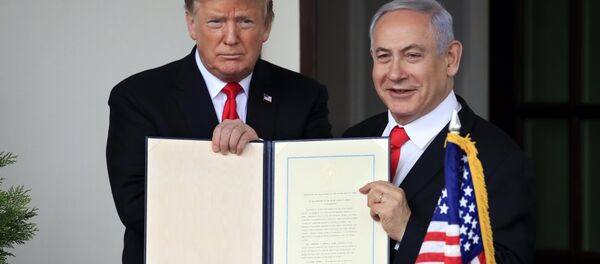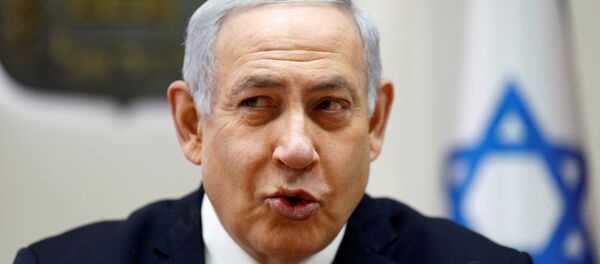The settlements are considered illegal under international law, but Israel disputes this. Last month the US recognised the occupied Golan Heights, seized from Syria in 1967, as Israeli territory. Israel has settled about 400,000 Jews in West Bank settlements; another 200,000 live in East Jerusalem. There are about 2.5 million Palestinians living in the West Bank; they seek to establish a state in the occupied West Bank, East Jerusalem and the Gaza Strip, and say the presence of settlements makes an independent state impossible. Israel contends that the Palestinians are using the issue of settlements as a pretext to avoid direct peace talks, adding that settlements are not a genuine obstacle to peace and are negotiable.
Sputnik spoke with Ms. Michal Kotler-Wunsh, lawyer and candidate from the Blue and White — Kahol Lavan — political alliance, for more insight on the issue.
Sputnik: The Blue and White alliance was created this February; what essentially does your bloc have to offer the Israeli public?
Michal Kotler-Wunsh: Blue and White is actually a joint slate formed by three parties that identified that the unity, the internal unity and cohesion of Israeli society was very deeply compromised in the last few years.
The perceived divisions are far less than those that have been displayed by a very fragmented political reality, which has led to actual reality of tens of parties running in this upcoming elections, and Blue and White seek to create a much more united front of Israelis from across a very broad spectrum.
Michal Kotler-Wunsh: The reason why it’s time for a change in Israel is that the sitting Prime Minister has been Prime Minister for the last 10 years, all together 13 years in government.
Benny Gantz is our candidate for Prime Minister, indeed, the sense is at this point whatever hasn't been accomplished in 10 years won’t be accomplished in the next 10.
Sputnik: Mr. Gantz has no previous political background, I suppose it’s not a bad thing in terms of what you’ve just articulated in your previous answer, yet he's seen by some as the man to replace Netanyahu, why is that do you think, perhaps you can elaborate a little bit more?
Michal Kotler-Wunsh: Not coming from the political arena, though having been associated with this very divisive political culture is actually a great benefit, specifically this need to lead what we identify as a reconciliatory process, a deep reconciliatory process in Israeli society.
And, in fact, Mr. Gantz has had very extensive experience militarily as former IDF Chief of General Staff, really the largest organization that exists in the state of Israel, where military service is compulsory, where everybody from across the spectrum enlists into the army and really, as I said, without a difference of whether it's religion, or faith, or sex, or gender, or sexual preference, everybody is enlisted into the Israeli army.
So having led such a large institution very successfully and having had the very incredible ability to unite rather than to divide, to address every different segment and to create this sense of trust in leadership that we so deeply need, and I would say that globally we believe that in fact, yes, he has a tremendous opportunity to lead this country in the next ten years.
Term limitation, for example, for Prime Minister, and we touched upon it. The current Prime Minister has been sitting Prime Minister for 10 years; term limitation for Prime Minister is necessary not because of a specific person, not for personal reasons, but really with the acknowledgment that there are very important benefits to changing leadership.
Sputnik: Now meanwhile it’s reported that another leader of your bloc, Yair Lapid, had traveled to France to meet President Macron just ahead of the election, with some media suggesting that the French President is willing to help Lapid win the elections. How justified is this? How is the French President going to assist and support Mr. Lapid then, from your point of view?
Michal Kotler-Wunsh: Israel is a very, very vibrant democracy and a very independent country, and we, like every other country, don’t want any intervention of any country, not France, not the United States, not any country in what’s going to happen in the next 48 hours and ultimately in Tuesday's vote.
I would take it as an understanding that in order to defuse some of this misunderstanding that there’s only one Prime Minister that has these kinds of relations with external leaders, maybe it just defuses a little bit of that; it’s not personal.
The state of Israel has joint interests and values with many countries around the world and one of them happens to be France.
And in that trip, all I would say is that there are other potential leaders of this government, of this country, and in the upcoming government Yair Lapid will hold a joint rotation agreement with Benny Gantz and therefore it’s important to perhaps defuse that misunderstanding that there’s only one person, namely, the current Prime Minister, Benjamin Netanyahu that has those sorts of relationships.
Sputnik: The current political leader is presently involved in corruption scandals, how are you planning to tackle corruption in the country?
Michal Kotler-Wunsh: I think that this growing breach of trust between the leadership and the people of different countries around the world is really disconcerting.
The corruption is really one of the root causes and can prevent from the ability to advance this process, the reconciliatory process and this faith that we would like to rebuild between leadership and the people.
Because, as you refereed to, the current Prime Minister has an indictment that’s actually scheduled, subject to a hearing that's scheduled to take place in the coming months. This deepens the risk and the lack of distrust between leadership and people. And in fact, Blue and White has named corruption and the fight against corruption as something it will tackle in the first hundred days.
It will tackle, as I said, the term limitations and all kinds of coalition funds that are given between parties when the government is formed here that are root cause of this corruption.
Sputnik: What’s your bloc's wishes to amend the Nation State bill; what alterations are needed to this legislation now in your view?
Michal Kotler-Wunsh: So the Nation State Law in a very declaratory way actually reasserts Israel's legitimacy to exist as the nation-state of the Jewish people.
And that’s okay, there’s no problem with that statement, except that it overlooked the minorities who are deserving and actually have equal civil rights in the state of Israel.
They currently have them except that the law didn’t name them and didn’t declare those equal civil rights. And, therefore, Benny Gantz has committed that there will be an amendment whether to this bill or through another bill, that clarifies that there’s civic equality of all citizens of the state of Israel, regardless of religion, and sexual orientation, and gender, and so forth.
There is and there will be clear legal measures taken and clarification made that civic equality is something that the state of Israel not only upholds and protects, but it is the very fiber and the foundation upon which it was founded.
Sputnik: How are you and your party going to deal with this unbelievable issue — the peace agreement with Palestine?
I would say that Blue and White, with that message of hope, and Benny Gantz and Yair Lapid in their rotation government have announced that they will turn every stone possible in order to advance that peace while preserving, being committed to the ultimate security of the state of Israel, of all of its citizens, and will be there and readywith that outstretched hand, being there and that will continue to be there, as far as Blue and White is concerned, when there is an active partner willing to negotiate and to discuss a resolution and an end to conflict.
Views and opinions expressed in this article are those of Michal Kotler-Wunsh and do not necessarily reflect those of Sputnik.






